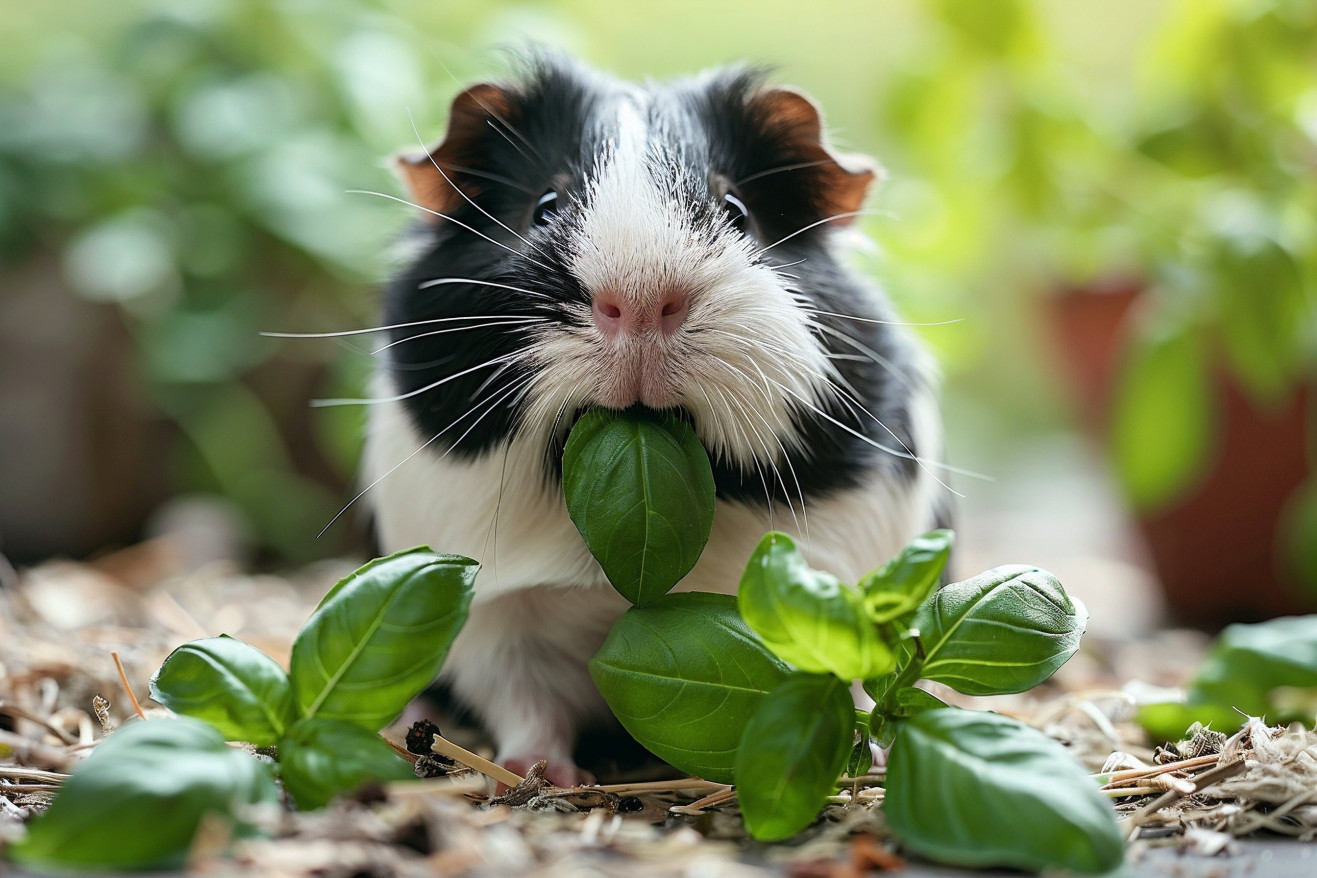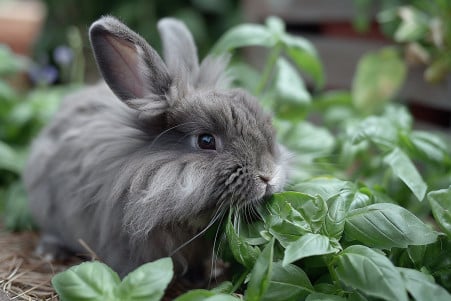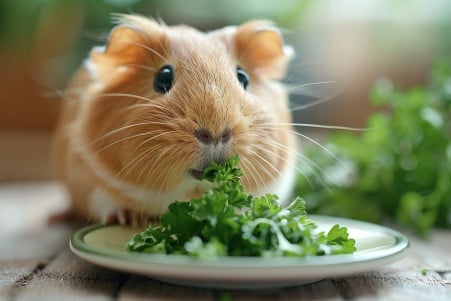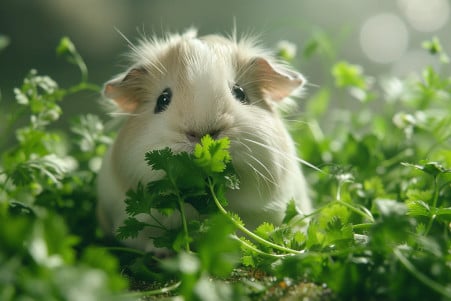Can Guinea Pigs Eat Basil? Navigating Herb Diets for Pets
11 March 2024 • Updated 10 March 2024

Basil is a delicious herb for humans, but is it a good choice for your guinea pig’s herbivorous diet? Guinea pigs can eat basil, including the leaves and stems. Basil is a good source of vitamins A and K, is low in calories, and even contains vitamin C. However, because it’s high in calcium, basil should be given in moderation, a few times a week.
This article will review veterinary recommendations and nutritional research to explore the nutritional requirements of guinea pigs and the role of herbs in meeting those requirements.
It will also cover the potential benefits and drawbacks of adding basil to a guinea pig’s diet, citing information from reputable sources such as veterinarians and scientific studies on the nutritional needs of small mammals. The aim is to offer a thorough, evidence-based review of this topic to help you make the best choices for your pet.
Can guinea pigs eat basil?
What Do Guinea Pigs Eat?
Guinea pigs need a diet that includes hay, fresh vegetables, and specially formulated pellets to stay healthy. Hay is important for their digestive health and to keep their teeth from getting too long. The RSPCA recommends feeding high-quality hay and fresh grass daily, but warns against feeding them lawnmower clippings, which can cause an upset stomach.
Vitamin C is also an important part of their diet. Like humans, guinea pigs can’t produce this essential nutrient on their own. According to The Spruce Pets, guinea pigs need between 10–30 mg of vitamin C per day, and this amount can go up during times of stress, such as pregnancy, lactation, or illness. A lack of vitamin C can lead to scurvy, which can be fatal.
It’s important that guinea pigs get a well-rounded diet that includes a variety of nutrients. For example, while fresh vegetables are important, they should be introduced slowly to avoid digestive upset.
As a chapter in the NCBI Bookshelf explains, guinea pigs are picky eaters and may not accept new foods, so it’s important to introduce them slowly and carefully to ensure they get the right balance of vitamins and minerals they need to stay healthy.
Herbs in Guinea Pig Diets
Herbs are more than just a tasty addition to your meals; they can also be a healthy supplement to your guinea pig’s diet. As noted by Pets on Mom, some of the most popular herbs for guinea pigs are fennel, dill, parsley, and basil. All of these herbs offer essential vitamins, minerals, and antioxidants that can help your pet stay healthy.
While herbs like basil are anti-inflammatory and can help with digestion, it’s important to be careful about how much you give your pet because of their calcium levels, as pointed out by Bunny Meadow.
GuineaPiggles recommends that you introduce herbs slowly and in small amounts to avoid any tummy troubles. By giving your pet a mix of herbs once or twice a week, you can make sure that they get the benefits of different herbs without overwhelming their digestive system.
It’s also important to remember that not all herbs and vegetables are safe for guinea pigs, so it’s always a good idea to check with a vet before you make any changes to your pet’s diet.
By adding basil to your guinea pig’s diet, you can help them take advantage of its health benefits, including its antimicrobial properties and its ability to promote a healthy digestive system, according to Bunny Meadow. By learning about the nutritional value of basil, you can make sure that you’re adding it to your pet’s diet in a way that will help them the most.
Basil’s Nutritional Benefits for Guinea Pigs
When used in moderation, basil is more than just a tasty herb; it can also be a nutritional powerhouse for guinea pigs. According to Precision Nutrition, basil is a good source of vitamins A and K, which are important for vision and blood clotting, respectively, and it also contains some vitamin C, which is a guinea pig’s essential nutrient because they can’t produce it themselves.
A study in PMC even showed that basil’s antioxidant properties help fight oxidative stress and support the immune system, so it has a lot of potential health benefits.
That said, it’s important to use it in moderation, especially because basil is high in calcium, which is important for bone health but can cause issues like bladder stones if guinea pigs are given too much. Healthline says that basil’s essential oils have antimicrobial and anti-inflammatory effects that can be good for your pet’s health, but they should be part of a guinea pig’s diet, not the main focus.
Because of basil’s many nutritional benefits, it’s easy to see how it can be a positive addition to a guinea pig’s diet, as long as it’s introduced in a way that ensures it’s part of a balanced diet and not the main focus.
How to Feed Basil to Your Guinea Pig
As with any food you give your guinea pig, it’s important to remember that basil should be fed to them in moderation. Guinea Piggles recommends feeding basil to your guinea pig a couple of times a week as part of their daily veggie mix, which should be no more than one cup.
When you first introduce basil, mix small pieces of the fresh herb in with other guinea pig–safe veggies to ensure that they get a variety of nutrients.
Make sure that the basil is always fresh and raw. Dr. Jess explains that you should never feed your guinea pigs cooked basil because it loses its nutrients and can be hard for them to digest. Also, make sure to take out any uneaten basil from your guinea pig’s cage quickly to prevent bacteria from growing, a point that Maida Siddiqui also agrees with.
While dried basil may seem like a good option, it’s not recommended because it can lose its nutritional value and it may have preservatives or other additives in it. By feeding your guinea pig fresh, thoroughly washed basil in the right amounts, you can make sure that they get all of the benefits and none of the drawbacks, making basil a healthy and flavorful addition to their diet.
Everything in Moderation: Risks of Feeding Basil to Your Guinea Pig
While basil can be a nutritious part of your guinea pig’s diet, it’s important to understand the risks of overfeeding. Guinea Piggles notes that basil has a high calcium content, at 177mg per 100g.
In guinea pigs, too much calcium can cause bladder stones, which is a painful condition. Make sure to watch for symptoms like straining to urinate, blood in the urine, and a loss of appetite, as these could be signs of a negative reaction.
If you notice that your guinea pig is having trouble digesting basil, including symptoms like an upset stomach or changes in urination, you should stop feeding them basil and contact your vet.
The PDSA warns that guinea pigs need a balanced diet, and if they don’t get the right nutrients, it can lead to serious health problems. It’s always a good idea to talk to your vet before making any big changes to your pet’s diet, including adding basil. That way, you can make sure it’s safe.
And remember, the most important thing is to make sure your guinea pig has a well-rounded diet that includes plenty of vitamins, minerals, and fiber to keep them healthy and happy.
Final Thoughts: Basil and Your Guinea Pig’s Diet
So, basil, with its aromatic appeal, can be a part of your guinea pig’s diet, providing important nutrients like vitamins A, K, and C. However, the common thread here is that it should be used in moderation. As the research shows, the benefits of basil are most helpful when it’s used in small amounts, which is in line with the specific dietary needs of these small, sensitive animals.
Veterinary professionals agree that guinea pigs need a well-rounded diet that includes hay, fresh vegetables, and the right amount of vitamin C. When adding something new like basil, it’s important to do so in a way that’s safe and watch for any signs of digestive or urinary problems.
It’s important to be a responsible pet owner, which means being dedicated to learning about and meeting the unique dietary needs of guinea pigs to ensure their long-term health. While we’re suggesting that herbs like basil be used in moderation, we’re also suggesting that you work with your vet to learn more and make sure you’re feeding your pet in a way that will help them be as healthy and happy as possible.


